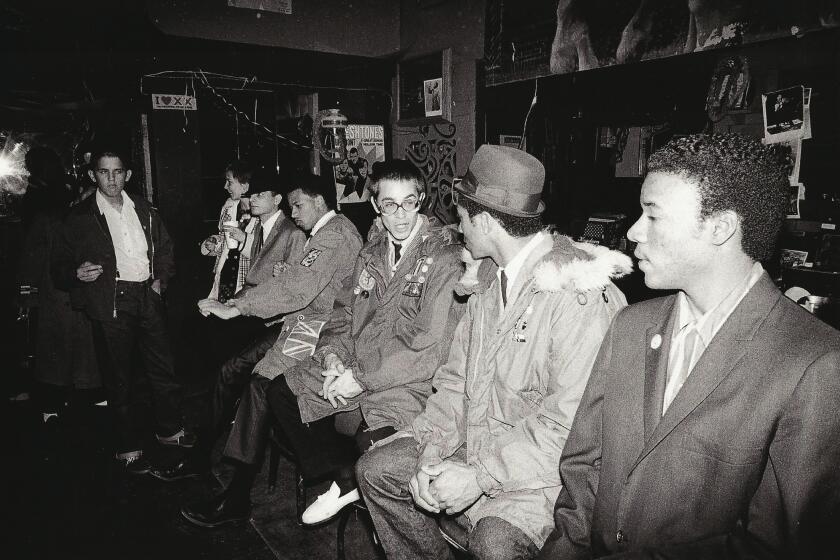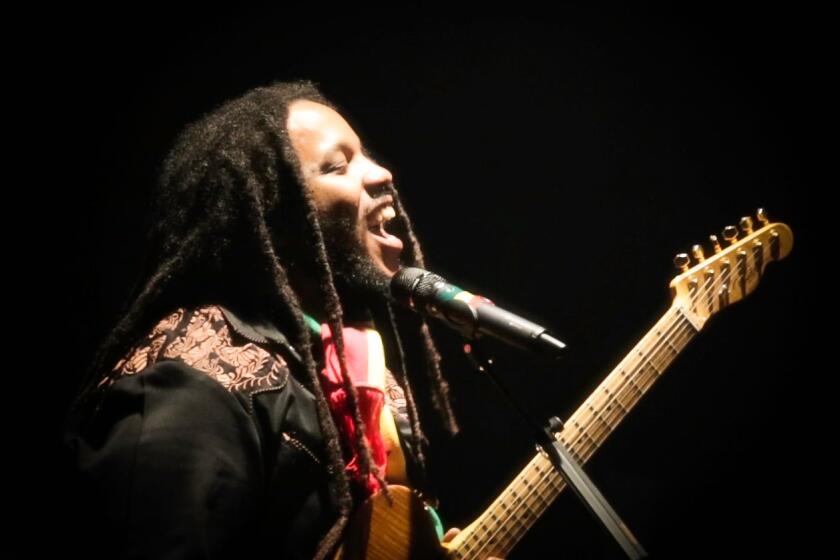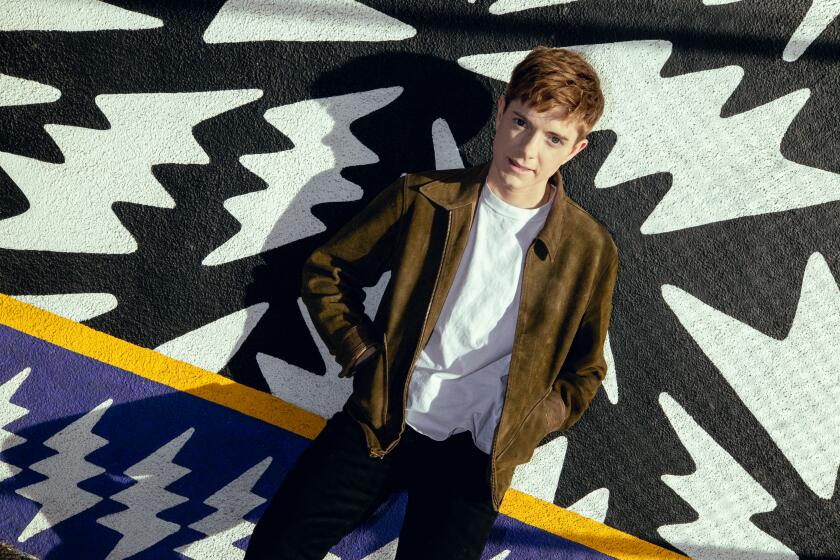As ska’s conquering ruler, Derrick Morgan delivers freedom sounds to a new generation
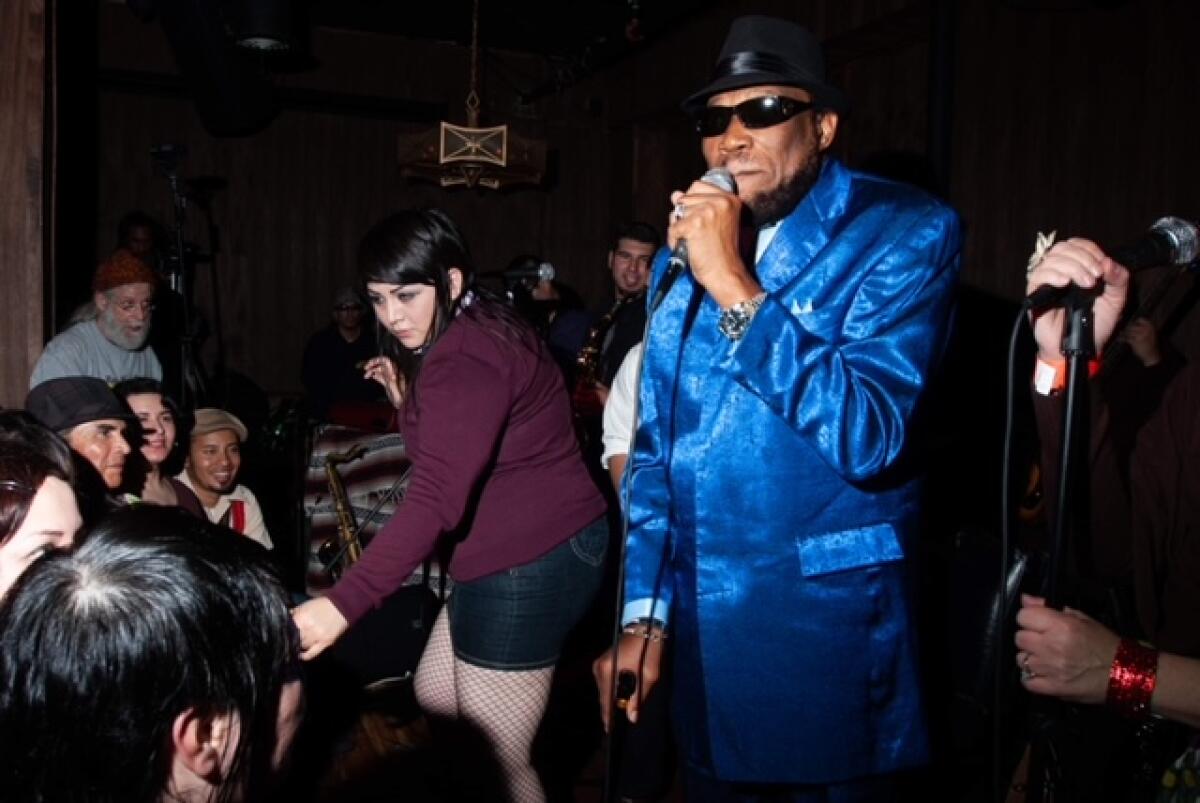
- Share via
Derrick Morgan is a legend — a rougher than rough, tougher than tough, onetime rude boy who helped shape the sound of ska in the 1960s.
Singing braggadocious tunes and loving duets for more than 60 years, Morgan has cemented his title of the King of Ska. His personality — described as jovial, funny and straight-shooting — combined with pristine, soulful vocals have made him a fan favorite for generations.
“They are nice people. They always come out to my show and they like me!” Morgan, 82, says of his international fanbase from his home in Jamaica. “All of them give me good applause and so on.”
Morgan’s casual attitude belies his important, and lengthy, musical history. Influenced by the sounds of James Brown, Smiley Lewis and Professor Longhair coming through his radio from stations in Miami, Morgan recorded his first songs in 1959 for legendary producer Duke Reid. As opportunity knocked, Morgan would record for Clement “Coxsone” Dodd’s rival soundsystem and later went down Orange Street in Kingston to producer Leslie Kong’s Beverley’s label. While many of Morgan’s early songs were boogie-shuffles, by 1960 he was undeniably leading the ska charge with his songs occupying the top seven spots on Jamaican pop charts simultaneously. Among his hits for Kong was “Housewives Choice,” a bouncy ska duet with frequent collaborator Millicent “Patsy” Todd.
“Housewives Choice” ignited a highly publicized musical war with Prince Buster, an equally popular singer-producer who accused Morgan of stealing his tunes. Although the feud was strictly musical — the two were privately friends — their string of “attack songs” netted a number of classics for Morgan, including “Blazing Fire.”
As an “elder statesman” in the burgeoning ska scene, Morgan became Kong’s audition man, giving crucial green lights to Jimmy Cliff, Desmond Dekker and Eric “Monty” Morris. Although multiple artists claim to have discovered him, Morgan recalls auditioning a young Bob Marley who, at the time, was “a dancer more than a singer.”

From his home in the U.K. (where he lived until the early ‘80s), Morgan produced dozens of rocksteady and reggae tunes, including early tracks from Garnett Silk and Tony Rebel. Many of Morgan’s own songs, such as “Conquering Ruler” and “Moon Hop,” have become anthemic, empowered singalongs for legions of international reggae lovers. “Seven Letters,” recorded for famed producer Bunny Lee in 1969, is often cited as one of the earliest examples of reggae.
Morgan has performed his songs around the world, backed by young reggae musicians , who draw significant inspiration from the singer.
Morgan will hit the stage in Los Angeles at theEl Rey Theatre on Aug. 20 in honor of the 60th anniversary of Jamaican independence. The lineup, which features the Steady 45s backing Morgan and the reunion of ‘90s ska band Ocean 11, is a multi-generational look at Southern California reggae (with a little help from the Capsouls, like minds from Bakersfield). It’s also a showcase of Jamaica’s freedom sounds, which have impacted cultures thousands of miles away from Kingston.
“Derrick’s work in the earliest part of Jamaica’s independence and beyond have informed [our] band on styles of playing,” says Steady 45s trumpet player Alfredo Barrios. Adds 45s guitarist Joe Nieves, “We’re a part of this tradition. These guys got us our start, we were inspired by them and covered their songs when we first started, and then now we’ve got a chance to back up quite a bit of them.” Ocean 11 singer Persephone Laird, a.k.a. Queen P, often sings the parts of Morgan’s duet partners. “It means a lot to be able to represent those females,” she says. “To stand on stage next to Derrick and sing these duets, I cry every time because it’s really a gift.”
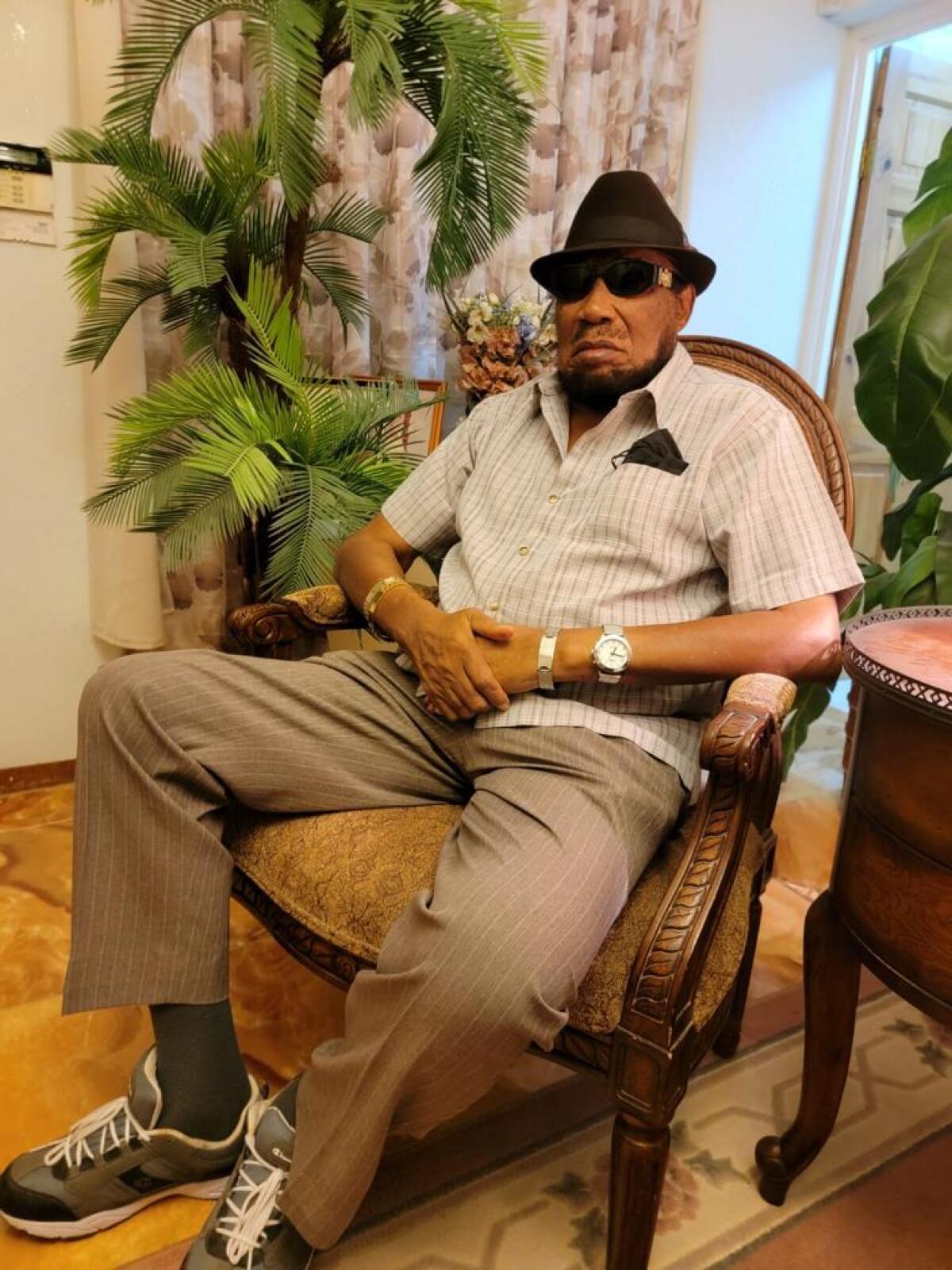
While a half dozen or so of Morgan’s contemporaries are alive, few perform with regularity. Though failing vision requires that he is escorted on stage by his wife, Nellie, the man still embodies the sobriquet “the Conquering Ruler.”
Following a decades-long push for decolonization, Jamaica gained independence from Britain on Aug. 6, 1962. Morgan, then 22, was inspired and quickly penned the freedom anthem “Forward March.” The song was released on Independence Day and became an immediate hit.
“I’m not political. But I am a man who used to write songs about what I heard about, what’s going on around me. When I heard about the two leaders of Jamaica — which was Alexander Bustamante and Norman Manley — went to bat for the independence and they get through, I said ‘I should write a song,’” Morgan remembers, adding that “Forward March” was recorded in one take at Federal Studios with a cast of now-fabled session players.
On that night Morgan toured Kingston on a truck with a sound system, singing “Forward March” alongside Jimmy Cliff and Desmond Dekker. “There was a big celebration … all different nation was there. And I was on a truck box singing with my band and everyone was dancing with everyone, hugging and jumping up and down,” Morgan recalls. “I’ll never live to see that back in Jamaica, because you can’t find that celebration again.”
Although ska was on the horizon, and “Forward March” is the perfect bridge between Jamaica’s interpretation of R&B shuffle and the ska that was to come. (Most scholars and fans peg the “official” arrival of ska to 1963 with the formation of instrumental supergroup the Skatalites.)

“Leading up to independence, a lot of artists were playing American R&B. Some of those musicians, especially the ones that were Rasta-inclined, wanted a music of their own,” posits Junior Francis, an emcee and KXLU DJ who as a booker and promoter has been working with Morgan for many years. “There was that search for your own, the search for self, a search for independence that was driving the musicians.”
At the time of independence, Francis was 11 years old. He recalls hearing “Forward March” and other ska hits on his transistor radio – as a child. “Not only did I hear them from a distance, I heard them everywhere I went!”
Independence certainly changed Jamaica which, prior to ’62, was “good and not-so-good,” Morgan says, adding that, today, there’s a visible difference in the country and the culture. “The leaders who take over, they do their best. We are on top right now; the only thing that matters is the crime,” he says. “We build up the country, we’re improving every day. I’m not a politician, but I like what’s going on now.”
Yet what is not going on now in Jamaica is ska music; the genre largely fell out of favor in the ‘70s and has since made way for reggae, dub and dancehall. “I like some of them [genres],” Morgan says. “But the best music is only ska, ‘cause you have a whole orchestra with it. With these music that they’re making now, they’re just computer, drum and bass, you know?”
Even if it’s not a popular sound on the island, ska will live forever because of a dedicated swath of fans, collectors and bands playing in a traditional style. Morgan has been backed by many of these new groups, including locals the 45s and the Delirians, Minnesota’s the Prizefighters, and Mexican group Travelers All Stars. “They are backing me like the Jamaicans [did],” he notes, adding, “My music, everyone like it. Old and the young. I can remember one night [in Spain] I came out of my hotel room and go downstairs … some little youth waiting to see me in the lobby. About 14 years old!”
L.A. is certainly doing its part to keep ska alive and in the public consciousness. “We just want everybody to still create that open space for a strong community,” Laird says of the El Rey show. “You’re gonna see a legend; you’re gonna see a veteran band; you’re gonna see a newer band; you’re gonna hear some DJs. We’re all going to be together in one big room and we’re all going to keep passing the music on, because that’s the most important thing.”
Morgan — whose legs may be a little weaker, whose performance is perhaps less energetic than his last run through town — is still marching forward, his strong tonality a marvel. He’s released new music through his son’s record label, and has done collaborations with Sean Kingston and also with Bob Marley’s son, Ky-Mani Marley. In the fall, he will be honored at New York’s True Tribute Awards, which celebrates legends of Jamaican music and culture. On Jamaica’s Independence Day, Morgan will be awarded the Ministry of Culture’s Jamaican Music Icon Award.
When asked if there is anything else he would like fans of ska to know about him, he chuckles, presumably rolling his eyes a bit behind his dark glasses. “The amount of interviews I do around, they should know everything!” he quips. “We have to find something else to let them know!”
More to Read
The biggest entertainment stories
Get our big stories about Hollywood, film, television, music, arts, culture and more right in your inbox as soon as they publish.
You may occasionally receive promotional content from the Los Angeles Times.
